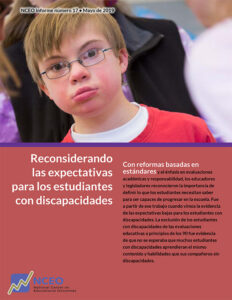 Selected publications of NCEO and affiliated projects have been translated into several languages. Reconsiderandolas expectativas para los estudiantes con discapacidades is a Spanish translation of Students with Disabilities in Educational Policy, Practice, and Professional Judgment: What Should We Expect? The purpose of this brief is to summarize some of the past exclusionary practices that resulted from low expectations for students with disabilities, and how those were addressed in policies related to standards-based reform. Suggestions are provided for policymakers, states, and technical assistance providers on how to work with districts, schools, and educators to revisit expectations for students with disabilities.
Selected publications of NCEO and affiliated projects have been translated into several languages. Reconsiderandolas expectativas para los estudiantes con discapacidades is a Spanish translation of Students with Disabilities in Educational Policy, Practice, and Professional Judgment: What Should We Expect? The purpose of this brief is to summarize some of the past exclusionary practices that resulted from low expectations for students with disabilities, and how those were addressed in policies related to standards-based reform. Suggestions are provided for policymakers, states, and technical assistance providers on how to work with districts, schools, and educators to revisit expectations for students with disabilities.
A project affiliated with NCEO, the Improving Instruction for English Learners Through Improved Accessibility Decisions project, in collaboration with the West Virginia Department of Education, recently developed native language translations of parent information contained in the parent-educator toolkit which were previously released in English. Translations are available both in print and in audio format in Arabic, Traditional Chinese, Simplified Chinese, Spanish, and Vietnamese. The audio versions are identical in content to the written versions. The following parent information sheets have been translated and can be accessed from the Parent-Educator Toolkit:
- Accessibility Features and Accommodations: Information for Parents or Guardians
- Building Successful Communication Between Parent or Guardian and Teacher: Information for Parents or Guardians
- Working with Language Interpreters: Information for Parents or Guardians
Another project affiliated with NCEO, TIES Center, recently published a Spanish translation of 10 Reasons to Support Inclusive School Communities for ALL Students. The brief, 10 razones para apoyar a las comunidades escolares inclusivas para todos los estudiantes, delineates ten reasons that supporting inclusive school communities for ALL students is important, but in a nutshell, inclusive learning communities are better, richer, and more effective when all students, including those with disabilities, are full participants.
